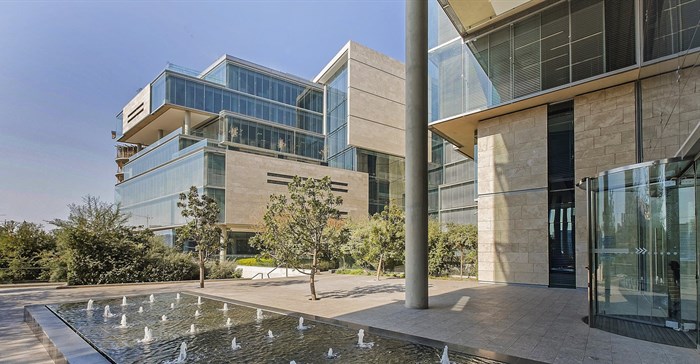Redefine Properties highlighted in its 2023 ESG investor update that the business is scaling up ESG initiatives to optimise performance and strengthen resilience in a challenging operating environment.

Source: Supplied. A Redefine net-zero building in Sandton.
"While there are signs of improvement, the environment in which South African Real Estate Investment Trusts (REITs) are operating remains challenging," notes Anelisa Keke, chief sustainability officer at Redefine.
"Our ESG strategy responds to sustainability-related risks through scalable interventions, providing an opportunity to not only de-risk our portfolio, but to create and preserve value for ourselves, our tenants and other key stakeholders."
Mitigating climate impact, cutting costs
The update noted an extreme risk of baseline water stress throughout most of Redefine's South African portfolio, while EPP, its retail-centric Polish property investment platform, has several environmental transition risks, with recent and upcoming EU regulations requiring buildings to improve their energy-performance levels in the next few years.
Keke says that Redefine’s water-reduction strategy has already resulted in significantly lower water consumption. In the next two years, Redefine is targeting a cumulative 140 megalitre reduction in its water footprint across its SA buildings.
This will be achieved through a combination of initiatives including rainwater harvesting facilities, with five new facilities planned for Gauteng, the rollout of smart water meters and through the installation of Propelair toilets, which use up to 80% less water per flush than ordinary toilets.
Meanwhile, Redefine's energy-management strategy, which responds to the elevated risk of extended load shedding and rising energy prices, is focused on reducing electricity consumption through behavioural interventions, energy-efficient lighting retrofits and renewable energy installations.
It has a solar PV footprint of 40.2MWp which is currently installed in South Africa, with 39.6MWp potential rooftop solar PV installations identified across the EPP portfolio.
The path to net zero
Keke says Redefine’s green building journey, which goes back to 2012 when the company obtained its first Green Star SA certification, provides valuable guidance to implementing net-zero building practices.
"Our Green Building programme is part of a long-term journey towards achieving net zero and demonstrates to our stakeholders that our certified assets have a positive impact on the environment, as well as the health and wellbeing of our occupants.”
Redefine currently has 186 active Green Star SA certifications across the SA portfolio in the short term and new buildings will meet net-zero standards from 2030 onwards.
"Our environmental efforts are driving cost reductions," Keke explains. "We are starting to see an increase in net operating income as a result of certain on-site environmental initiatives, which count positively towards valuations."
Through upcoming initiatives such as the Green Lease rollout, these will become revenue drivers in due course. Keke adds, “We have evidence of international tenants and brokers prioritising Green Star rated offices, which makes our buildings more competitive in a tough environment.”
CSI to community impact
When it comes to CSI, Keke explains: "Our approach to CSI has evolved into an impact-driven socio-economic development strategy that forms part of the company-wide impact framework. This strategy ensures that the design and operation of our assets respond to community needs and that our business activities transform lives."
Redefine's 2030 vision is to make sure that socio-economic development initiatives are in place for communities in over 50% of all buildings and achieve cumulative targets of 1, 000,000 people impacted directly and 1,000 additional jobs created.
The new approach will ensure sustainable, quantifiable impacts (with short- and long-term targets) that positively impact stakeholders, the property sector and the communities in which Redefine operates.
Keke states that Redefine's focus on impact creation allows the company to mitigate key socio-economic risks.
"Socio-economic development initiatives that are impact-focused help us manage the risks of socio-economic instability caused by unacceptable levels of unemployment, poverty and inequality. Initiatives such as the Maponya Mall Community Hub focus on youth skills development to prepare a pipeline of new entrants to the job market, which helps reduce unemployment."
Sustainable finance, stakeholder commitment
Redefine said that employee buy-in has allowed the company to scale up critical ESG initiatives. All Redefine employees will be trained on Green Building certifications in SA in 2023/24. This upskilling allows the company to offer a compelling service to tenants who want to expand their ESG initiatives.
Keke said that tenant buy-in and co-operation is essential for the company to achieve its energy-, water- and waste-reduction goals. As such, Redefine has engaged several of the national retailers that occupy a combined gross lettable area of 574,613 square metres on the ESG strategy and offers opportunities to collaborate on environmental and social initiatives.
Similarly, the ability to finance the low-carbon transition of its assets is critical to enabling Redefine's ESG strategy. Its sustainable finance facilities provide the company with an avenue to leverage its ESG performance to access sustainable finance markets.
Recently, Redefine issued a green bond that was oversubscribed 1.9 times, with R1.9bn received in bids, resulting in an upsized allocation to R1bn across three-, five- and seven years. The proceeds raised will be used to refinance eligible green assets (across its property portfolio) that align with the group's overarching, long-term climate-resilient framework.
Redefine continues to participate in the S&P Global Corporate Sustainability Assessment and Global ESG Benchmark for Real Assets (Gresb) indices. It is taking steps to incorporate the IFRS S1 and S2 Standards, and the JSE Sustainability Disclosure Guidelines into its sustainability reporting.





































